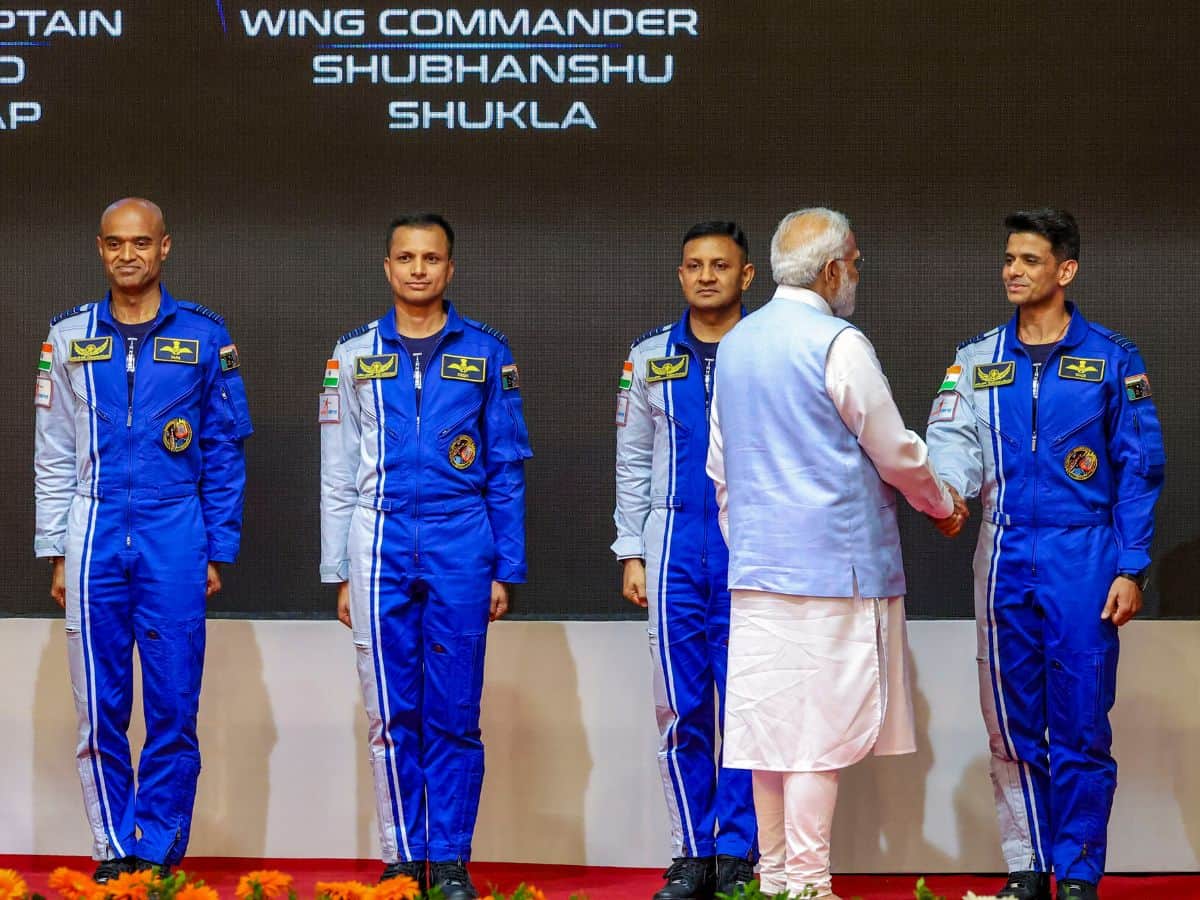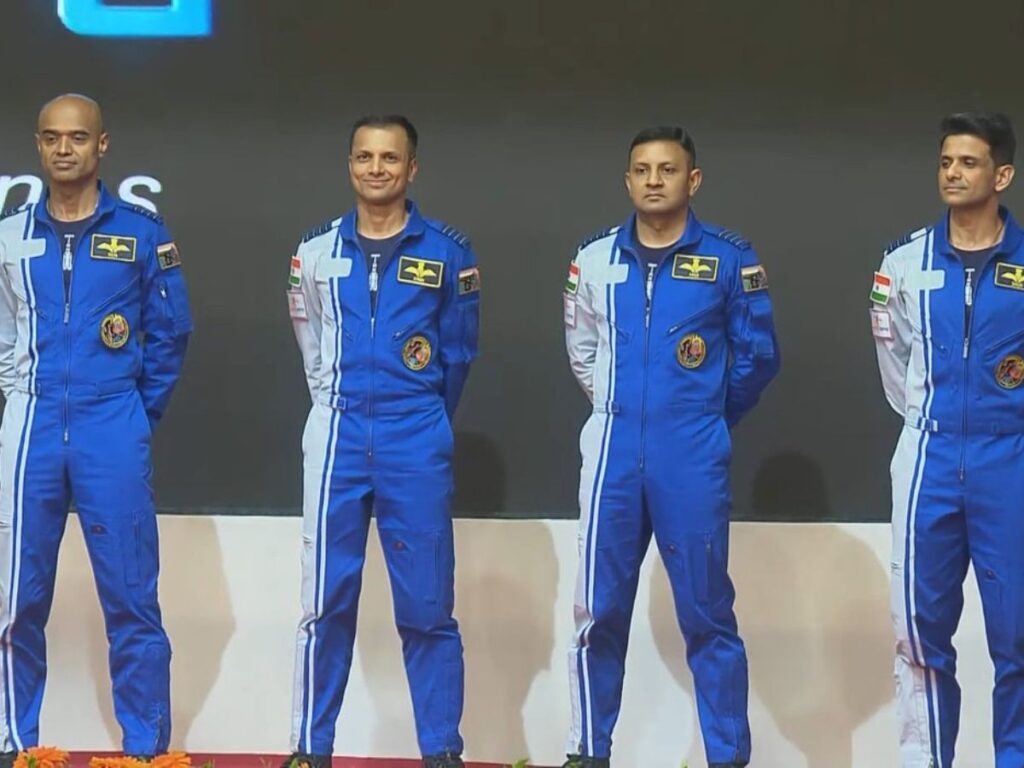
Thiruvananthapuram: Prime Minister Narendra Modi made a historic announcement on Tuesday, revealing the names of the four astronauts who are currently undergoing rigorous training for India’s first-ever human space flight mission, Gaganyaan.
Addressing the audience at the Vikram Sarabhai Space Centre (VSSC) at Thumba near here, the Prime Minister introduced to the nation the esteemed astronauts: Group Captains Prasanth Balakrishnan Nair, Angad Pratap, Ajit Krishnan, and Wing Commander Shubhanshu Shukla.
Bestowing them with the prestigious ‘astronaut wings,’ Modi hailed these astronauts as “four forces” representing the aspirations of India’s 1.4 billion people. He emphasised the significance of this mission, noting that after four decades, an Indian is poised to venture into space. “This time around, the countdown, the timing, and even the rocket would be ours,” Modi declared.
Reflecting on the symbolic importance of the astronauts’ mission, PM Modi described them as not merely individuals but as four ‘Shakti’ carrying the hopes and dreams of 140 crore Indians into space.
Modi revealed the names of the four astronaut-designates in the presence of dignitaries, including Kerala Governor Arif Mohammed Khan, Chief Minister Pinarayi Vijayan, Minister of State for External Affairs V Muraleedharan and ISRO chairman S Somanath.
The PM expressed immense pride that the majority of components for the Gaganyaan mission are manufactured in India, underscoring the nation’s self-reliance in space exploration.
PM Modi further extolled the astronauts and asserted that their names have become intertwined with India’s success.
He lauded their dedication to training, which included the practice of Yoga, and hailed them as representatives of India’s resilient Amrit generation, known for their unwavering determination and ability to overcome challenges.
Modi said that India’s space sector’s contributions were not only sowing the seeds of scientific temperament among the younger generations, but also providing an impetus for the country to emerge as a global player in the 21st century.
He said that few nations have achieved the feat of reaching Mars in the first attempt, launching more than 100 satellites in a single mission, landing on the south pole of the Moon and the successful insertion of Aditya L1 solar probe in its orbit 15 lakh kilometres from Earth. “All of you are opening new doors of future possibilities,” he told the ISRO team, adding that it was estimated that India’s space economy will grow five-fold and touch 44 billion dollars in next 10 years.
The PM said that India was becoming a global commercial hub in the field of space and in the coming days, it will once again go to the Moon, retrieve samples from there, and by 2035 the country will have its own space station. “In this Amrit Kaal, an Indian astronaut will land on the Moon in an Indian rocket,” he said.
Team ‘Gaganyaan’

The Indian Air Force has revealed the background and credentials of Group Captains Prasanth Balakrishnan Nair, Ajit Krishnan, and Angad Pratap, and Wing Commander Shubhanshu Shukla.
Group Captain Nair, born in Kerala’s Thiruvazhiyad on August 26, 1976, is an alumnus of the NDA and recipient of Sword of Honour at the Air Force Academy. Commissioned in the IAF’s fighter stream on December 19, 1998, he has flown variety of aircraft including Su-30 MKI, MiG-21, MiG-29, Hawk, Dornier, An-32, etc.
A Category A flying instructor and test pilot with approx 3000 hrs of flying experience, he has commanded a premier fighter Su-30 squadron.
Group Captain Nair is also the alumnus of the United States Staff College and Directing Staff at the Defence Services Staff College (DSSC), Wellington, and Flying Instructors School (FIS), Tambaram.
Group Captain Krishnan, born in Chennai on April 19, 1982, is alumnus of the NDA and recipient of President’s Gold Medal and Sword of Honour at the Air Force Academy. Commissioned in the IAF’s fighter stream on June 21, 2003, he has flown variety of aircraft including Su-30 MKI, MiG-21, MiG-21, Mig-29, Jaguar, Dornier, An-32 etc.
A flying instructor and test pilot with approx 2,900 hrs of flying experience, he is also alumnus of the DSSC, Wellington.
Group Captain Pratap was born in Allahabad (now Prayagraj) on July 17, 1982. Alumnus of the NDA, he was commissioned in the IAF’s fighter stream on December 18, 2004 and has also flown variety of aircraft including Su-30 MKI, MiG-21, MiG-29, Jaguar, Hawk, Dornier, An-32 etc. He is also a flying instructor and test pilot with approx 2,000 hrs of flying experience.
Wing Commander Shukla was born in Lucknow on October 10, 1985. Commissioned on June 17, 2006 in the IAF’s fighter stream, he is a fighter combat leader and test pilot with approx 2,000 hrs of flying experience on a variety of aircraft including Su-30 MKI, MiG-21, MiG-29, Jaguar, Hawk, Dornier, An-32 etc.
3 space projects inaugurated
Earlier, Modi inaugurated three major space infrastructure projects worth around Rs 1,800 crores of ISRO during his visit to the VSSC.
The projects include the SLV Integration Facility (PIF) at the Satish Dhawan Space Centre, Sriharikota, the new ‘Semi-cryogenics Integrated Engine and Stage Test facility’ at ISRO Propulsion Complex at Mahendragiri and Trisonic Wind Tunnel’ at VSSC, Thiruvananthapuram.
The Trisonic Wind Tunnel at VSSC produces controlled uniform airflow over scaled models of rockets and aircraft to evaluate their aerodynamic characteristics and designs. It features a test section size of 1.2 meters and can generate speeds ranging from subsonic to supersonic, up to 4 times the speed of sound (Mach number 4.0).
The Mahendragiri unit is a state-of-the-art facility capable of handling large flows of propellants. It stands 51 meters tall and has a flame deflector depth of 30 meters.
The PSLV Integration Facilities at Sriharikota were developed to increase launch frequency from the First Launch Pad (FLP) and include Integration Building, Service Building, Rail Track, and associated systems.
In his speech on the occasion, the PM also emphasised upon the “important role” played by women in the country’s space programme. “Whether it is Chandrayaan or the Gaganyaan, no such project can be imagined without women scientists,” he said and pointed out that more than 500 women were in leadership positions in the ISRO.



